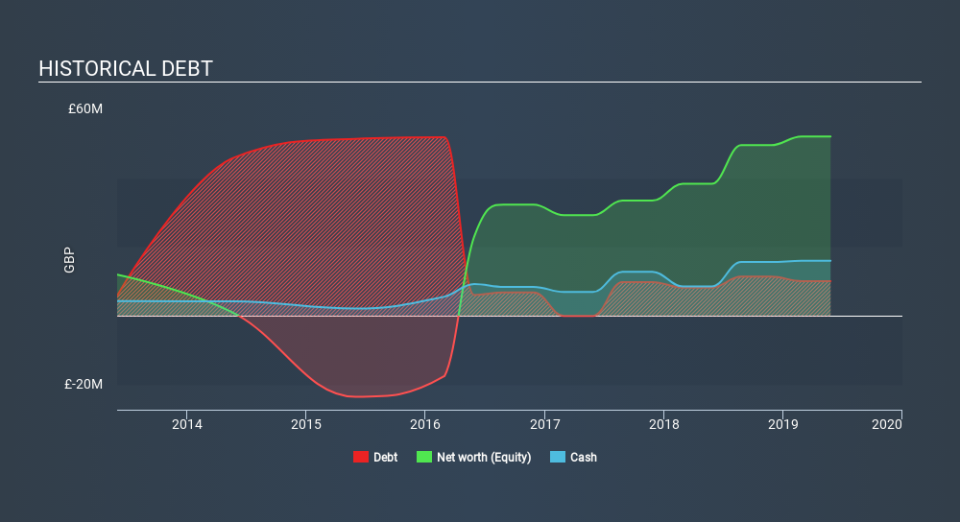Is Joules Group (LON:JOUL) Using Too Much Debt?

The external fund manager backed by Berkshire Hathaway's Charlie Munger, Li Lu, makes no bones about it when he says 'The biggest investment risk is not the volatility of prices, but whether you will suffer a permanent loss of capital. So it seems the smart money knows that debt - which is usually involved in bankruptcies - is a very important factor, when you assess how risky a company is. Importantly, Joules Group Plc (LON:JOUL) does carry debt. But the more important question is: how much risk is that debt creating?
When Is Debt Dangerous?
Generally speaking, debt only becomes a real problem when a company can't easily pay it off, either by raising capital or with its own cash flow. Part and parcel of capitalism is the process of 'creative destruction' where failed businesses are mercilessly liquidated by their bankers. However, a more frequent (but still costly) occurrence is where a company must issue shares at bargain-basement prices, permanently diluting shareholders, just to shore up its balance sheet. Of course, debt can be an important tool in businesses, particularly capital heavy businesses. The first thing to do when considering how much debt a business uses is to look at its cash and debt together.
View our latest analysis for Joules Group
How Much Debt Does Joules Group Carry?
As you can see below, at the end of May 2019, Joules Group had UK£10.1m of debt, up from UK£8.2 a year ago. Click the image for more detail. However, it does have UK£16.0m in cash offsetting this, leading to net cash of UK£5.88m.
How Strong Is Joules Group's Balance Sheet?
The latest balance sheet data shows that Joules Group had liabilities of UK£52.8m due within a year, and liabilities of UK£3.45m falling due after that. Offsetting these obligations, it had cash of UK£16.0m as well as receivables valued at UK£7.92m due within 12 months. So its liabilities total UK£32.3m more than the combination of its cash and short-term receivables.
This deficit isn't so bad because Joules Group is worth UK£158.9m, and thus could probably raise enough capital to shore up its balance sheet, if the need arose. But it's clear that we should definitely closely examine whether it can manage its debt without dilution. Despite its noteworthy liabilities, Joules Group boasts net cash, so it's fair to say it does not have a heavy debt load!
And we also note warmly that Joules Group grew its EBIT by 14% last year, making its debt load easier to handle. When analysing debt levels, the balance sheet is the obvious place to start. But it is future earnings, more than anything, that will determine Joules Group's ability to maintain a healthy balance sheet going forward. So if you want to see what the professionals think, you might find this free report on analyst profit forecasts to be interesting.
But our final consideration is also important, because a company cannot pay debt with paper profits; it needs cold hard cash. While Joules Group has net cash on its balance sheet, it's still worth taking a look at its ability to convert earnings before interest and tax (EBIT) to free cash flow, to help us understand how quickly it is building (or eroding) that cash balance. Over the last three years, Joules Group reported free cash flow worth 20% of its EBIT, which is really quite low. That limp level of cash conversion undermines its ability to manage and pay down debt.
Summing up
Although Joules Group's balance sheet isn't particularly strong, due to the total liabilities, it is clearly positive to see that it has net cash of UK£5.88m. And it also grew its EBIT by 14% over the last year. So we are not troubled with Joules Group's debt use. Over time, share prices tend to follow earnings per share, so if you're interested in Joules Group, you may well want to click here to check an interactive graph of its earnings per share history.
If you're interested in investing in businesses that can grow profits without the burden of debt, then check out this free list of growing businesses that have net cash on the balance sheet.
If you spot an error that warrants correction, please contact the editor at editorial-team@simplywallst.com. This article by Simply Wall St is general in nature. It does not constitute a recommendation to buy or sell any stock, and does not take account of your objectives, or your financial situation. Simply Wall St has no position in the stocks mentioned.
We aim to bring you long-term focused research analysis driven by fundamental data. Note that our analysis may not factor in the latest price-sensitive company announcements or qualitative material. Thank you for reading.

 Yahoo Finance
Yahoo Finance 
